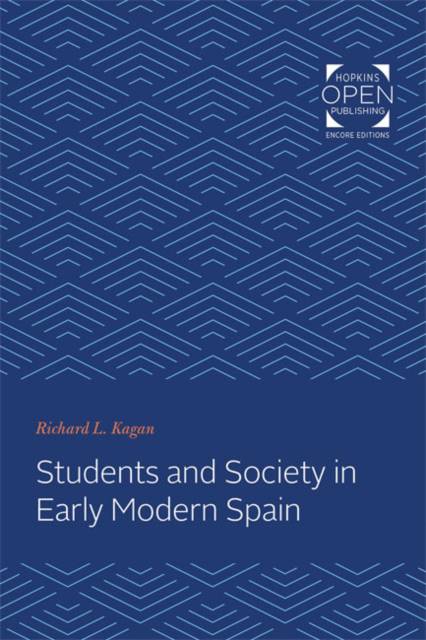
- Afhalen na 1 uur in een winkel met voorraad
- Gratis thuislevering in België vanaf € 30
- Ruim aanbod met 7 miljoen producten
- Afhalen na 1 uur in een winkel met voorraad
- Gratis thuislevering in België vanaf € 30
- Ruim aanbod met 7 miljoen producten
Omschrijving
Originally published in 1974. The close connection between universities and bureaucratic institutions such as church and state was perhaps first noticed by Max Weber. Such institutions, he observed, require a dependable source of cadres to run them. Thus, the size and composition of university enrollments are often a function of bureaucratic needs. Richard Kagan examines the dynamics of this relationship historically by racing the growth and decline of the university system in Castile, the heart of the Spanish monarchy, between 1500 and 1809. This period marked the emergence of a strong Habsburg state and a militant Catholic church, both of which looked to the universities for "educated" men. Accordingly, the universities grew rapidly, and by 1600 Castile was perhaps the best-educated kingdom in Europe. But this did not last. Jobs were increasingly filled through nepotism, causing students to abandon the universities in search of other careers. By 1700, the universities were small, backward institutions. Kagan begins by examining the nature and position of primary, secondary, and university institutions in Hapsburg Spain, concentrating on the extent and purpose of literacy.
In Part II, Kagan discusses the growth and development of the ruling hierarchies in the bureaucratic world and gives special consideration to the criteria used to recruit officials. The author concludes with an assessment of the impact of bureaucratic changes in church and state on the universities of Castile. The data he collects on changes in the curriculum, the professorate, and the social and geographical backgrounds of the students are used to support hypotheses about the spectacular rise and collapse of university education in Spain, the process of modernization, the development of bureaucracies, and the crisis of the Spanish monarchy. Students and Society in Early Modern Spain demonstrates that institutions of higher learning often collapse when they become over-professionalized and fail to respond to changing conditions. Thus, Kagan provides a study of education and social change--of why educational institutions are central to a society in one century but only peripheral to it in the next. The author casts new light not only on the short lived educational revolution of the sixteenth century but also on education in other societies, both past and present.
Specificaties
Betrokkenen
- Auteur(s):
- Uitgeverij:
Inhoud
- Aantal bladzijden:
- 305
- Taal:
- Engels
Eigenschappen
- Productcode (EAN):
- 9781421430522
- Verschijningsdatum:
- 1/12/2019
- Uitvoering:
- Paperback
- Formaat:
- Trade paperback (VS)
- Afmetingen:
- 152 mm x 229 mm
- Gewicht:
- 453 g

Alleen bij Standaard Boekhandel
Beoordelingen
We publiceren alleen reviews die voldoen aan de voorwaarden voor reviews. Bekijk onze voorwaarden voor reviews.











